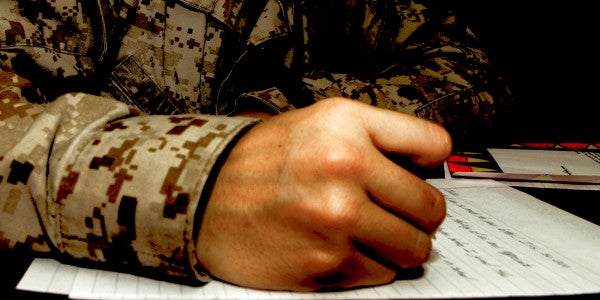A Soldier Details The Realities Of War To Her 18-Year-old Son
Editor’s Note: Task & Purpose is proud to publish this fictional essay by Brooke King — the winner of a...

Editor’s Note: Task & Purpose is proud to publish this fictional essay by Brooke King — the winner of a writing contest presented by the Armed Services Arts Partnership and the Atlantic Council’s The Art of the Future Project. The contest sought letters home from a conflict set in the 2030s as part of a first-person exploration of what homecoming might be like after future wars.
“To My Son On His Eighteenth Birthday”
Do not do it. Do not follow after me. At first, they will tell you a lie. Sign here, they will say. Then, when you go to training, they will tell you half-truths. Some will see combat, others might get lucky. But if you do sign away your life, become the property of the government, a number stamped on metal and hung around your neck, it is only when you step onto the battlefield, where ever it may be, that you will discover the meaning of war as the heat from the sun bubbles the vermillion red blood to a gradual mudded brown. The taste of death will kiss you on your cheek long enough for you to know that iron is the smell of blood, and that this moment is fermenting in your mind the olfactory triggers of watching the body bloat and the flies fester around the star-shaped holes that carry the message: first confirmed kill. And as you sign your name to an incident report after the bullets stop flying and your pulse no longer radiates in your ears, after action recalls will force a guttural reactions that pulls your hand away as it waivers over the last loop in your name. You will think about the l-shaped incision in the soldier's chest, the one who took a bullet for you. You will think about the closed-gap stitch that keeps the serrated flesh from splaying outward, a scar tissue mark that she will point to when they ask her years from now what the war did to her. And though this might never be you, I pray you may never know what it is to feel the death rattle up your spin and out your mouth as you ask a fellow soldier for just one sip, one sip of water before you go. I hope that the words deepen you, breaking open the hardened part of your soul that begs not to understand how your mother went to war, for your reluctant ears to listen when I beg you not to go, for you to hear the words: I did it so that you wouldn't have to.
Related: These letters show how little war changes over time »
Perhaps then, you might know, as the past creeps towards the present, how some survive and others barely live. For now, it seems, you must walk towards war until your generation decides that no other need take our place. And if this is not enough to dissuade you, if it is suffering you must hear then listen to Taps play long and slow, dragging the battlefield's lullaby in E flat and image standing there waiting for it to end, acutely aware that someday, it might be you that the trumpet player purses his lips to when the mouthpiece comes close enough to hallow out the sound of mourning.
I think for now, as I write this, that a soldier may never truly be free, the training ingrained in muscle and sinew alike as though unburdening it from your flesh mean stripping the memories from your bones. But something surely must remain, and so the war must fill the body, if only to keep it from collapsing. And this locker, this place full of pain, and sorrow, and suffering, it too must be carried home and kept, if only to remember that a piece of you still feels anything at all. And though I may not make it past tomorrow, and you reading this may mean that you have chosen to go to war, I want you to know that I love you and there is nothing, not even a war, that can tear you away from my heart. If I can give you advice, one that you will listen to, it is that we are all the same when we bleed. We are what is left when bullets and bodies bags cannot measure the forgiveness in your eyes when you let loose your fear upon the trigger well, or the textured finger-tip feeling when your hand must press down on a gaping bullet hole wound, or the dryness you feel on your lips when you mouth the words, I'm sorry.
And though I have seen war and stare at it even now, I know that there will be no peace because there is no real end to war, only the absence of it, a lull in the fighting where another generation is born for the kill, one, my son, that you might be part of.
And yet, though you may choose to be a part of it, I pray that someday this world might give us a war and no one will come.
Brooke N. King served in the U.S. Army, deploying to Iraq in 2006 as a wheel vehicle mechanic, machine gunner, and recovery specialist. Her work has been published in O-Dark-Thirty, War, Literature, & Arts, and Prairie Schooner. Brooke is working on her memoir, “Full Battle Rattle,” and teaching veteran writing at Saint Leo University’s MA Creative Writing program.
